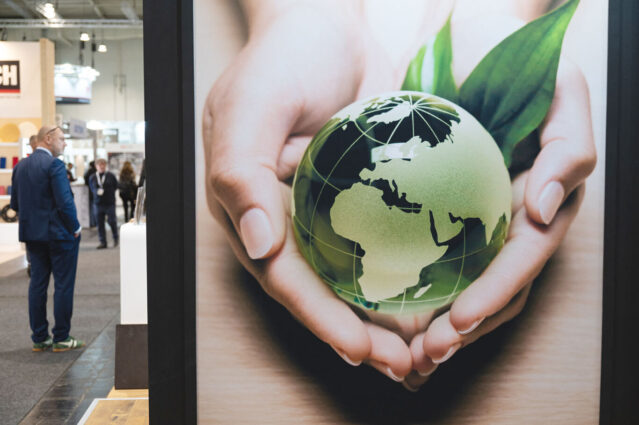
© Deutsche Messe AG | Rainer Jensen
Sustainability: Major issues challenge the entire industry
An article by Barbara-Maria Lüder, Manager of Legal affairs, Taxes, Technology and Sustainability at AUMA
Barbara-Maria Lüder has been responsible for legal affairs, tax issues and technology at AUMA since 2006 and for sustainability since 2008.
© AUMA | Christian Kruppa
For many AUMA members, 2026 will be the first year in which they have to report on their sustainability activities. For the 2025 financial year, they will be required to demonstrate their commitment to the Corporate Sustainability Reporting Directive in their annual reports. The German trade fair industry is currently preparing for the extensive data collection required for this. However, the European Green Deal's package of measures includes a number of additional regulations, such as due diligence obligations concerning the supply chain and energy efficiency in companies. These will pose significant challenges to the entire economy in the coming years.
The German trade fair industry has already initiated its joint transition to climate neutrality. The starting signal was clearly audible for all AUMA members in the summer of 2022. It was preceded by the articulation, agreement and adoption of a joint position on ecological sustainability on a broad participatory basis. This was based on the many years of experience and knowledge of a number of fast runners among the members.
Green electricity
The world is in a constant state of flux. AUMA's position on sustainability in the industry requires constant development. The last update was completed in December 2023: The primary objective is to achieve climate neutrality by 2040, five years ahead of Germany's national climate target. To achieve this, several ongoing adjustments will be necessary.
Our colleagues at Messe Stuttgart are delighted to have won the 2024 German Sustainability Award. This is the first time that the jury has honoured a trade fair company for its long-standing commitment to sustainability.
© Landesmesse Stuttgart GmbH
The next milestone is the use of green electricity by 2025. A survey conducted in early 2024 revealed that 81% of AUMA member companies are confident to achieve this goal by 2025. Some of our members have achieved this already. The last mile is the toughest, though.
Avoiding food waste in exhibition catering is also important to us. The permanent evaluation of demand-driven food and beverage services and the use of reusable tableware help to reduce the amount of waste generated by catering. At the beginning of 2024, almost half of the organisers we surveyed had a comprehensive sustainability policy in place for their catering operations. This is mainly due to the prevailing shortage of available catering services since the start of the pandemic.
However, we are committed to stay tuned.
© Jean-Luc Valentin
© Messe München
© Deutsche Messe AG | Rainer Jensen
It is crucial, too, to reduce waste production, enhance recycling rates, and utilise recyclable materials for stand construction. There are effective strategies for reducing waste when constructing stands. One such strategy is to plan multifunctional exhibition stands, with the reuse of exhibition furniture or stand components becoming the norm. This has a visible positive impact on costs. The realisation that individuality can be maintained despite the reuse is important for the acceptance of sustainable stand construction. Trade fair professionals are already aware of this. One of the hallmarks of Germany as a trade fair destination is the creative and expressive stand construction that is a trademark of German design. It is important to keep this! Some of the Germany's leading stand builders are already demonstrating how individuality and sustainability can be successfully combined.
Recyclable materials are an environmentally friendly choice. They might be used in a creative way and can help to keep costs down. This is convincing and, in some cases, the solution is straightforward. By planning a trade fair participation in advance, the volume of materials to be transported can be reduced, thereby minimising packaging waste. And this is most effective when everyone involved - organisers, exhibiting companies, stand builders and visitors - pull together and everyone makes a serious effort to avoid waste.
© Koelnmesse GmbH | Daniel Kollath
Energy efficiency is achieved using state-of-the-art refrigeration technology. From 2028, Koelnmesse plans to save 5,800 metric tonnes of CO₂ per year.
© Koelnmesse GmbH | Alita Holzhauer
Mobility
However, the biggest challenge facing the events industry on the whole is to promote the most sustainable mobility possible for all stakeholders. First, public transport must be integrated into the transport concept for events in a coherent way. It is also important to work with all partners in the travel industry, as airlines and hotels are also looking to implement sustainable solutions - at least for themselves. The first essential step on this path: Informing our participants about sustainable travel options and facilitating their planning decisions.
Finally, it is worth noting that attending leading trade fairs may eliminate the need for additional travel, as trade fairs are industry gatherings for entire sectors. Bringing people together under one roof at one location is a good possibility to pave the way for follow-ups by phone or video-calls. Thus, further travel might become obsolete. We are working on precisely that.
More about our industry position on sustainability.







